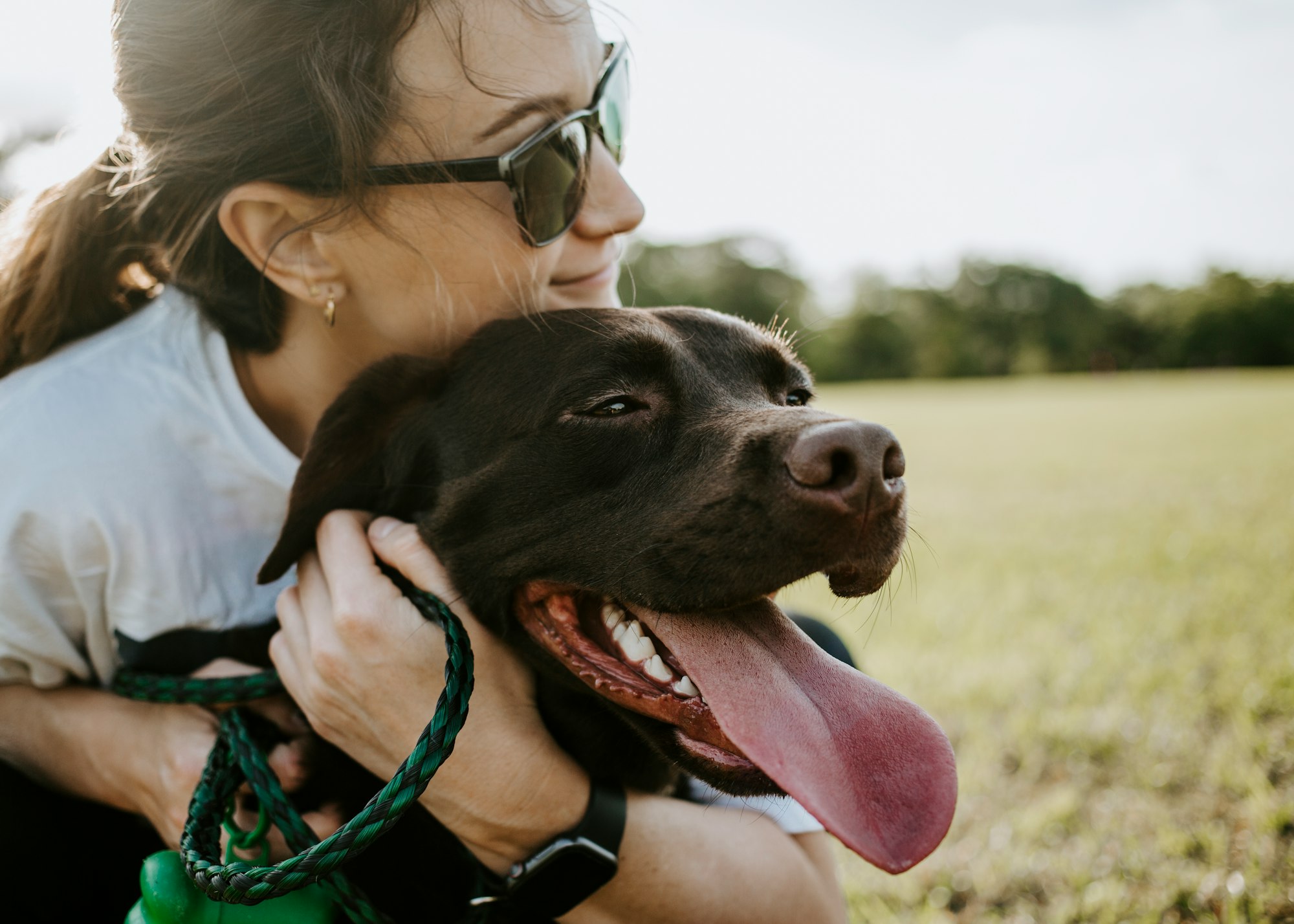If you've heard of melatonin, the chances are that you or someone you know had some trouble sleeping. So, just what is melatonin? Can dogs take melatonin? And what does it do?
What is melatonin?
Melatonin is a hormone made inside the body and is usually released at night to prepare the body for sleep. It plays a vital role in regulating the sleep-wake cycle. For this reason, melatonin is commonly used as a short-term treatment for sleep disturbances like jetlag and insomnia. Because it's a substance naturally occurring in the body, it's often preferred over more chemical sleeping tablets as an initial intervention for sleep problems.
Stop Googling - Ask a Real Vet
Melatonin generally has a calming effect on the body and can also be used to alleviate anxiety.
But this blog isn't about humans. What about our four-legged canine friends? Can dogs have melatonin? Sure, Rover isn't lying awake at night worrying about that report he needs to finish or tossing and turning because he's just gotten back from a business trip to Australia. But can melatonin be useful for dogs?
Of course, human supplements generally aren't safe or appropriate to share with dogs, but is melatonin different?
Can dogs have melatonin?
"Can I give my dog melatonin?"
Most human supplements are not appropriate to share with your pooch. However, melatonin is naturally producing in dogs, and so it's considered a safe supplement for canines. Dogs produce melatonin naturally, just like humans do, so supplementation should be safe under the right circumstances and at the correct melatonin dosage for dogs.
While you can give dogs melatonin, we would always encourage you to get supplements specifically formulated for dogs or ask your vet if they recommend any specific brands. Many human melatonin supplements contain xylitol, which is poisonous to dogs, and sometimes also other potentially harmful ingredients. If you're using a brand formulated for humans, make sure you check the ingredient labels thoroughly.
Melatonin for dogs has not been thoroughly studied. Still, VCA claims that giving dogs melatonin can help with a variety of health and behavioral issues. As always, before starting your pup on any supplements, it's a good idea to run it past your vet to be absolutely sure that it's in the best interests of your dog.
Harmful ingredients such as xylitol, which can be found in many melatonin supplements made for humans, may cause toxicity in your dog when ingested, calling for an emergency. Toxicity and other possible pet emergencies can be scary. Because of this, having the support and assurance that you need during pet emergencies would be a big help. This is why the Pet Emergency Fund is a good investment for you and your beloved pets.
Pet Emergency Fund offers $3000 annually for pet emergencies, covering up to 6 pets. You won’t have to worry about having to wait for reimbursements as well since the payment is made as soon as they get the veterinary bills. In scary situations such as pet emergencies, the Pet Emergency Fund has got your back. And because we love our blog readers, including you, we are giving an exclusive 27% off on subscriptions if you follow this link.
What does dog melatonin treat?
"Can I give my dog melatonin for anxiety?"
Great, so melatonin is a naturally occurring substance, and it's shown to be helpful to dogs as well as humans. But when should you consider supplementing your dog with melatonin? What canine conditions respond to melatonin supplements?
Melatonin helps both humans and canines relax, keep calm, and get better quality sleep. The following problems are commonly aided by melatonin supplementation.
Sleep Problems

Melatonin generally has soothing properties and is used most often to treat sleep problems and help regulate the natural processes that tell your dog when it's time to sleep and when it's time to be awake. Older dogs with dementia or other cognitive impairments can benefit from taking melatonin to get better sleep. If you want to find out more about dog sleeping patterns, don't forget to check our article on why some dogs can sleep all day.
Anxiety

The calming properties of melatonin for dogs can be used to ease anxiety. This is particularly useful if your dog experiences separation anxiety or during times that are likely to be stressful for your dog.
Thunderstorms, visits to the veterinarian, relocating, and even a trip in the car can be made less traumatic through the calming properties of melatonin. Any time you need to help your dog stay relaxed and calm, melatonin might be able to help.
Non-allergic hair loss or alopecia
Does your dog get seasonal bald patches on either side of the abdomen? If yes, it's likely your pup suffers from seasonal alopecia or flank alopecia. Of course, it's best to check with your vet, but melatonin may help. Experts aren't sure why or how melatonin helps, but given the low probability of adverse effects, it's worth a shot if your vet gives the go-ahead.
Other uses
Melatonin can also treat hyperactivity, Cushing's disease, epilepsy, and it can even help dogs undergoing chemotherapy with weight gain. Research also shows that melatonin can be helfpul for alleviating an oxidative stress induced by ovariohysterectomy or calming healthy dogs during the anesthesia induction.
It's crucial to always work with your vet when choosing to make changes to your dog's diet, medication, and supplements. In the case of melatonin, using the correct dosage is essential. If your dog is already on medication for another illness, make sure to contact a veterinarian to ensure that supplementing with melatonin will not cause any interactions.
For a less stressful consultation, you can talk to a vet online using Petcube 24/7 Online Vet that provides instant access to licensed veterinarians ready to answer any questions you might have.
Potential side effects of melatonin for dogs
"What are the side effects of melatonin for dogs?"
Many pet owners like the idea of using something like melatonin because it's a less chemical intervention considering it's a hormone that your dog's body produces naturally. But this doesn't mean that it is without side effects or safety considerations.
Side effects from melatonin are rare but should not be treated lightly. If trying something for the first time, keep a close eye on your dog to look for signs of an adverse reaction so you can react quickly.
Potential side effects of melatonin for dogs include:
- Increased heart rate
- Itching
- Confusion
- Fertility changes
- Gastric upset and cramps
Melatonin is generally considered safe for most dogs, but it's still important to consult your vet before beginning any new supplements or treatments. Because of its calming properties, the most significant side effect of melatonin for dogs will be drowsiness. If your dog is experiencing severe drowsiness, don't leave them unattended as they can be more accident-prone in this drowsy state.
Drug interactions and risk factors of melatonin for dogs
"Is melatonin safe for dogs?"
If your dog is currently on any medications or is undergoing any treatment for a known illness, you must consult your vet before beginning any kind of supplementation. Melatonin shouldn't be given to pregnant dogs or puppies as to avoid any potential risks.
There's a chance that melatonin can interact with other medicines, so if your dog is being treated with other medication, be sure to check with your vet if it is safe to use in combination. For example, a research specifies that melatonin contributes to insulin resistance in dogs with diabetes, which can have dangerous implications for your pup's health.
Supplements aren't always regulated in all countries, so it's crucial to check ingredient labels before giving your dog melatonin. Many brands of melatonin supplements for humans contain xylitol, a sugar substitute, which is toxic to dogs and can cause some serious health problems if given to your dog. If you're unsure of which brand to use, check with your vet, who will be able to recommend one that is safe for your dog.
Melatonin dosage for dogs
"What is the correct melatonin dosage for dogs?"
As with most substances, the dosage can make the poison, so it's important to use an appropriate dose of melatonin for your pup. The below is rough dosage chart, which might vary depending on your dog's ailment needs. Consult your vet before beginning any supplementation.
- Dogs weighing less than 10 pounds should take around 1mg
- Dogs weighing between 10 and 25 pounds usually take around 1.5mg
- Dogs weighing between 26 and 100 pounds could take around 3mg
- Dogs weighing over 100 pounds could take between 3mg and 6mg
The appropriate dose for your dog will be primarily determined by your dog's size and the condition being treated. Therefore, it's essential to work with your vet to give your dog the best care.
Melatonin can be administered as a tablet, capsule, powder, or liquid that can be given with or without food. The effects take action fairly quickly, usually within 15 minutes of consumption, and last around eight hours at the correct dose.
You can chat a vet online about the best brand of melatonin supplement to use.
Final thoughts on melatonin for dogs
While melatonin is a natural supplement that can be given to dogs, owners should never treat any ailments in their dogs without consulting a trained veterinarian. Studies about melatonin's effectiveness for dogs are few, and most successful results are anecdotal.
There's a tiny chance for adverse reactions when supplementing with melatonin, but potentially an even greater risk when given to dogs already on medication for other illnesses. Pregnant dogs and young puppies must never be given melatonin as this can cause serious issues.
We say this a lot but always consult your vet. When it comes to the health and wellbeing of your canine companion, a vet should naturally be your first point of contact before trying to administer treatment yourself. A vet will know what melatonin dose, if any, is appropriate for your dog and which brand of melatonin supplement to use that doesn't contain ingredients that could harm your dog.
Was this article helpful?
Help us make our articles even better










